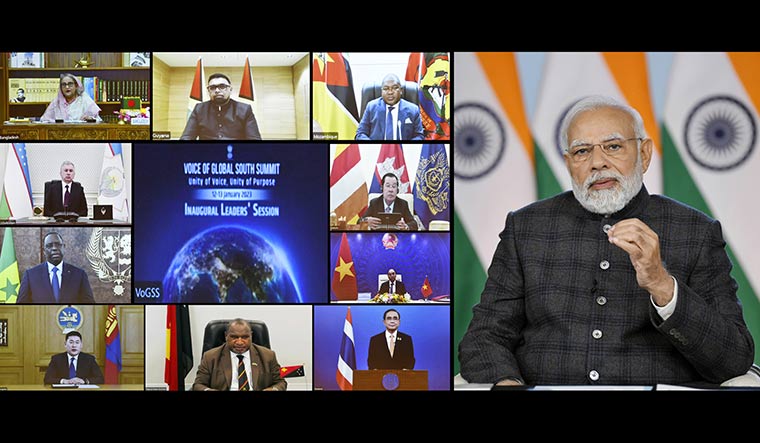Decoding India’s move to include Africa as permanent G20 member
- September 27, 2023
- Posted by: admin
- Categories: Africa, India

By Gurjit Singh
During India’s G20 presidency, the initiative to seek a permanent place for the African Union (AU) at the high table was perhaps the most daring of Indian diplomatic acts. With this, India manifested that incorporating concerns of the global south into the G20 process was not mere lip service.
In January, soon after India assumed the G20 presidency, India held the Voice of Global South virtual summit, which saw a large African participation. It was the first effort by a G20 president to obtain the opinion of so many countries outside the G20 membership. The priorities articulated there were amalgamated by India among its proposals while setting the agenda for G20.
The AU is often an invitee to G20 summits. It was established in 2002 as the successor to the Organisation of African Unity (1963). The New Partnership for Africa’s Development was a separate process emerging from the African Renaissance and was established shortly before the AU. When the G20 summit emerged, often the AU and NEPAD were separately invited. Subsequently, NEPAD became a part of the AU and is now the AU Development Agency, though it continues to be invited to G20 summits with regularity.
The AU and NEPAD represent 54 African members of the United Nations and therefore are the single largest group of countries within the global south and the world at large. India has consistently supported bringing African voices to the international table from the time of the Bandung (Afro-Asian) Conference (1955), the nonaligned movement’s Belgrade conference (1961) and beyond.
Africa remains in search of a permanent seat on the UN Security Council, the process for which is stalled. The G20, therefore, was the best place for Africa to find a permanent voice at this time. It is not coincidental that India, which has always championed Africa’s cause, has taken the initiative to include Africa as a G20 member on a permanent basis rather than as an invitee. This was a courageous act, because ever since the G20 was formed nobody tinkered with its membership for fear of competing claims.
India decided that diplomatic capital would have to be expended to achieve some change in the G20. Rather than expend it on an unlikely agreement on the Ukraine crisis, India thought it would perhaps be better to persuade members to include the AU and consequently give a larger voice to the global south in the G20. Along with South Africa―the only African country in the G20 so far―this would indeed bring diversity from Africa into the G20.
ALSO READ
- How India has emerged as leading voice of developing world
- ‘World can learn from India’: G20 sherpa Amitabh Kant
- ‘India’s G20 presidency is not without challenges’
- How Modi has moved foreign policy from elite to mass category
- How India can ‘tech up’ the climate challenge
- Bharat Mandapam—the G20 summit venue—shows India in all its glory
Some analysts ask why India did not announce this initiative during the Voice of Global South summit itself. Perhaps at that time, India was determining how its presidency would turn out. The previous Indonesian presidency had been shell-shocked by the Ukraine crisis and the big power divide. At the Bali summit though, these differences were overcome. A joint communiqué emerged. India was looking at continuing the Bali consensus, but it soon became evident at various ministerial meetings that the insistence of western countries on including references to the Ukraine crisis and criticising Russia would be opposed staunchly by Russia and China. The situation in Ukraine had altered from the time of the Bali summit, and Russia and China were unwilling to abide by the same consensus.
The choice now was whether India would expend time and effort to try and find a common language, which seems well-nigh impossible, unless something changes on the ground in Ukraine. India therefore decided that the agenda preferred by the global south should be pursued in all working groups and meetings across the board so that a focused G20 outcome could emerge, leaving the Ukraine crisis by the side. This is also preferred by Africa, which believes that its concerns are ignored as the Ukraine crisis dominates the discourse. Therefore, what was not feasible in January was feasible in June.
India is aware that trying to alter the membership of the G20 opens up many competing rivalries. Why only the AU? Why not other regional organisations like ASEAN (Association of Southeast Asian Nations) or CARICOM (the Caribbean Community) and the like? What happens to the claims of Spain and the Netherlands, which want to expand the European cohort in the G20 but have been placed as permanent guests? India’s initiative clearly lays out that the AU representing 54 countries of the global south is much more akin to the European Union than the ASEAN or CARICOM are. There is no comparison between the numbers of these regional organisations.
Several AU partners like the US, China, EU, Russia and others advocate AU’s inclusion. It is unclear however whether all these supporters of Africa see this as a lever to pry open the membership issues for their own ends. India has set the diplomatic ball rolling and awaits a consensus on AU’s inclusion.
The writer is former ambassador to the African Union and author of The Harambee Factor.
